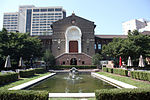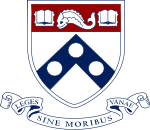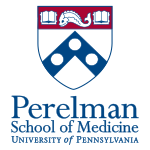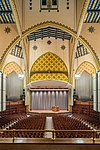The University of Pennsylvania (Penn or UPenn) is a private Ivy League research university in Philadelphia, Pennsylvania. Established in 1740, it is the fourth-oldest institution of higher education in the United States and among the highest ranked universities in the world. It is also one of nine colonial colleges chartered before the U.S. Declaration of Independence. Benjamin Franklin, the university's founder and first president, advocated for an educational institution that trained leaders in academia, commerce, and public service.
Penn has four undergraduate schools as well as twelve graduate and professional schools. Schools enrolling undergraduates include the College of Arts and Sciences, the School of Engineering and Applied Science, the Wharton School, and the School of Nursing. Penn's "One University Policy" allows students to enroll in classes in any of Penn's twelve schools. Among its highly ranked graduate and professional schools are a law school whose first professor wrote the first draft of the United States Constitution, the first school of medicine in North America in 1765, and the first collegiate business school (Wharton School, 1881). Penn is also home to the first "student union" building and organization (Houston Hall, 1896), the first Catholic student club in North America (Newman Center, 1893), the first double-decker college football stadium (Franklin Field, 1924 when second deck was constructed), and Morris Arboretum, the official arboretum of the Commonwealth of Pennsylvania.
As of June 30, 2021, the university had an endowment of $20.5 billion and in 2019 had a research budget of $1.02 billion. The university's athletics program, the Quakers, fields varsity teams in 33 sports as a member of the NCAA Division I Ivy League conference.
As of 2018, distinguished alumni and trustees include 2 Presidents of the United States, 3 U.S. Supreme Court justices, 32 U.S. senators, 163 members of the U.S. House of Representatives, 12 U.S. Cabinet Secretaries, 46 U.S. governors, 8 signers of the Declaration of Independence and 7 signers of the U.S. Constitution, 24 members of the Continental Congress, 9 foreign heads of state, and ambassadors to 51 different countries. As of October 2019, 36 Nobel laureates, 80 members of the American Academy of Arts and Sciences, 64 living billionaires, 28 of whom are alumni of Penn's undergraduate schools (one less than leader Harvard) 21 Marshall Scholars, 33 Rhodes Scholars, 16 Pulitzer Prize winners, alumni who have won 20 Tony Awards, 16 Grammy Awards, 11 Emmy Awards, and 4 Academy Awards (Oscars), an EGOT recipient, 43 Olympic medal winners (who won 81 medals, 26 of them gold), 2 NASA astronauts, and 5 United States Medal of Honor recipients have been affiliated with the university.







